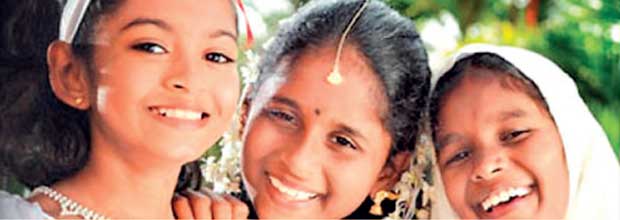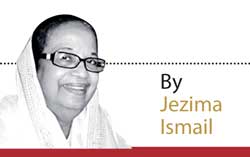Reply To:
Name - Reply Comment

 Well-known educationist and human rights advocator Deshabandu Jezima Ismail replies to our column titled “An open letter to my dear Muslim brothers and sisters Buddhist-Muslim relationship could be warmer” written by Dr. Ranga Kalansuirya and published on February 19. While thanking Dr. Kalansuriya for his open letter, Mrs. Ismail writing comes as a “response of a Muslim to the concern of a brother Buddhist”.
Well-known educationist and human rights advocator Deshabandu Jezima Ismail replies to our column titled “An open letter to my dear Muslim brothers and sisters Buddhist-Muslim relationship could be warmer” written by Dr. Ranga Kalansuirya and published on February 19. While thanking Dr. Kalansuriya for his open letter, Mrs. Ismail writing comes as a “response of a Muslim to the concern of a brother Buddhist”.
Every paragraph in the letter conveys a positive message so in order not to miss a single point, I have employed the style of replying every paragraph and as a result this article may lack a smooth flow - Nevertheless it illustrates the thankful response of a Muslim to the concern of a brother Buddhist to the existing relationship expressed in a straight forward and easy to comprehend style. The two cases from Myanmar and Sri Lanka were illustrative of the relationship between Buddhist and Muslim in Burma and Sri Lanka. In the former there was obvious tension and lack of understanding whereas in the latter there was warmth and understanding. Focusing on the Sri Lankan it was noted that issue that arose was based not on ethnic identity but something that arose out the international situation which resulted in a string of incidents against the Muslims. In the writer Dr. Ranga Kalansooriya’s words “We saw how you were humiliated and victimized with unsung state patronage in Aluthgama and several other places a couple of years ago, we the majority Sinhala Buddhist too were helpless and silently sympathising with you with limited or no options” - It was a period of great distress and the Muslim community is indeed grateful to the majority of Sinhala Buddhists for their concern but of course the inaction seemed a little puzzling. However what was the reaction of the Muslim? Thankfully none of them rose up in violent reprisals. In fact they seem to retreat into a corner. There seemed to be a blanket like silence as if they were victims in sackcloth and ashes mourning their predicament.
This attitude was alarming but gave space to the community to turn the search light inwards and find out the reason as to why such adverse acts were being foisted on them. A part of the community that was the thinking part activated itself into planning seminars, talks and discussions. One notable one was the launch of a movement which drew attention to the growing exclusiveness in a part of the community and the adoption of alien cultures which were fanned by extremist sects that were making their way into the community. The objective of the movement is to promote education for community empowerment with a Sri Lankan identity to live in a pluralistic society. The vision envisaged was the creation of a community strengthened with the knowledge of its goal of reconciliation living in harmony and peace in a united Sri Lanka. As mentioned in the article with a dawn of a new socio-political culture there is space enough to build a new country. Efforts are being harnessed to deal with the fundamentalism that plagues not only one country but the whole world. The article asks the question “Have you developed a mechanism to stop more Sri Lankan joining the battle of deadly fanatics… or at least address the issue of radicalism among your own brethren, mainly in the east and elsewhere?” Attention is definitely being directed to the area of radicalism and fanaticism. Unfortunately most of the information amongst us is based on assumptions and most articles that adopt these as the themes of their talks seem to do so as if to provoke negative sentiments that affect the community negatively. I am not stating this in a defensive mood, on the contrary, we have started to plan studies, surveys, research on the growing sectarianism. In fact there is also not only expressed interest but also planned programmes to elicit accurate data on these movements. There is no doubt that religious leaders and religious institutions such as the Mosque play a significant role and today many organized intra-religious programmes are implemented in order to promote the real meaning of the misunderstood Islamic ideals. The Quran has absolutely no place for extremism which results in terrorism and violence - “The essential purpose of the Quran is to develop in man a mind, the immediate function of which is to enable him to live in peace with himself and in peace with his external world of relations - “O mankind ! We created you from a single (pair) of a male and a female, and made you into nations and tribes, that ye may know each other (not that ye may despise (each other). Verily the most honoured of you in the sight of Allah is (he who is) the most righteous of you.” (Quran 49:13)

Talking of tensions within communities the base is lack of understanding. The Muslim community needs to reach out and minimize the notion floating around of its exclusive quality. This is indeed a worrying factor because in the past & since I belong to that era I can through experience both in being born in a remote village in the East and living in the town that relationships were warm and attitudes positive amongst communities. The easy going camaraderie in the village was such a pleasant sight. Whatever area one looked friendship reigned I would like to quote from the article - lines that depict the role of the Rev. Sobitha Thera “I think your warmth and openness to us during the funeral of the late Sobitha Thera. This was the best case study depicting the harmony and co-habitation between our two communities. I……… his demise was a great loss mainly to Sinhala Buddhist in bridging the gap between us”.
The article speaks of T.B. Jayah as a man who brought the various factions under one slogan for co-habitation - yes, where are such men? - The leaders of yore who carried the community with them with positive values and the cherished ideal of unity for their beloved country Sri Lanka. I speak of Dr. M.C.M. Kaleel, Sir Razik Fareed, Sir Mohammed Macan Markar. Dr. Badiuddins’ speech in 1939 as secretary of the All Ceylon Political Conference its the context of today “Let me assure my Sinhalese country men that I am one of them in demanding complete freedom for our country…. Let me also assure my Sinhalese friend that the brave community to which I belong shall never consider any sacrifice too great to make Lanka a happy prosperous and glorious country in the world where not one section of its population but every son and daughter of her soil shall legitimately take pride in her glorious destiny”. Dr. T.B. Jayah, Dr. M.C.M. Kaleel and Sir Razik Fareed were all in favour of supporting the movement to pave the way to the Island’s Independence as T.B. Jayah said….“Where the political freedom of this country was involved, they were prepared to go to any length even to the point of sacrificing advantages and benefit as a result of such action” - I repeat where are such leaders? Are they only of the past? All is not lost. We had a younger man in the figure of M.H.M. Ashraff who formed the Sri Lanka Muslim Congress which he felt was necessary because of the context of the time - Be that as it may it was a communal party & as reality has proved many a time communalism has more adverse effects than positive. However what I want to note is this charismatic leader was planning on a party for unity and this I did not gather from anyone but from him and we spent hours discussing this party the National Unity Alliance. I am now quoting from Aman Ashraff’s article addressing a gathering of the SLMC high command & politburo members (Hon. Ashraff) he said “As a party representing a minority in the country we have reached the limits of our abilities.
If we are to solve the nation and its problem at a greater degree we must then, now look to expand our horizons into national politics and aim in defining a role for ourselves within.”
He now dedicates himself to the formation of the National Unity Alliance (NUA) whose mandate was solely for a united Sri Lanka. What happened to NUA is not a story for this article but what is significant is there were younger men but now the horizon seems bereft of leaders to guide the destiny of the community. Dr. Ranga Kalansooriya speaking of the present context where there is hope for a cohabitation and reconciliation naturally questions the sectarianism evolving in the community. This nature of affairs is troubling but as mentioned earlier there is increasingly a growing awareness in the community to turn the searchlight inwards and towards reform and as rightly said by the writer radicalism & fundamentalism is a common enemy of all communities & definitely needs attention. Jihad is completely misunderstood by those not familiar with the connotation subscribe to it a bloodthirsty offence. However Jihad is actually action that is needed to reform a situation - such as taking action against destructive fundamentalism & extremism. The Muslim community has its task set out - it is not merely for the political leadership but for the wider community of professionals, academics, intellectuals, religious dignitaries and the wider citizenry of common sense. Borrowing from the article “The main factors that fuel ethno-religious tension is suspicion, lack of understanding and absence of direct engagement. I think both our communities should do more to address those issues” - You are right - I quote good advice to the community - from Dr. A.C.L. Ameer Ali - “There is an urgent need to revisit our political strategies. In my view it requires a fundamental change in political thinking. It is a change in which politics of inclusiveness and politics of pragmatism have to prevail over politics of exclusiveness and politics of ethnicity. Muslims cannot win their battles by fighting alone and they have to join with others who are prepared to sacrifice even their life and economic security to create a just society.
The way is long, fraught with impediment and obstruction but the will is firm and determined to work for harmony and peace and there will of course be guidance from the Divine.